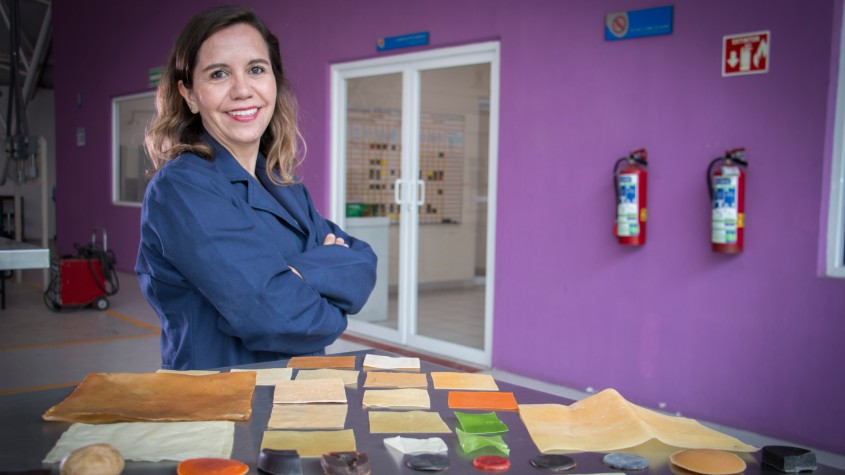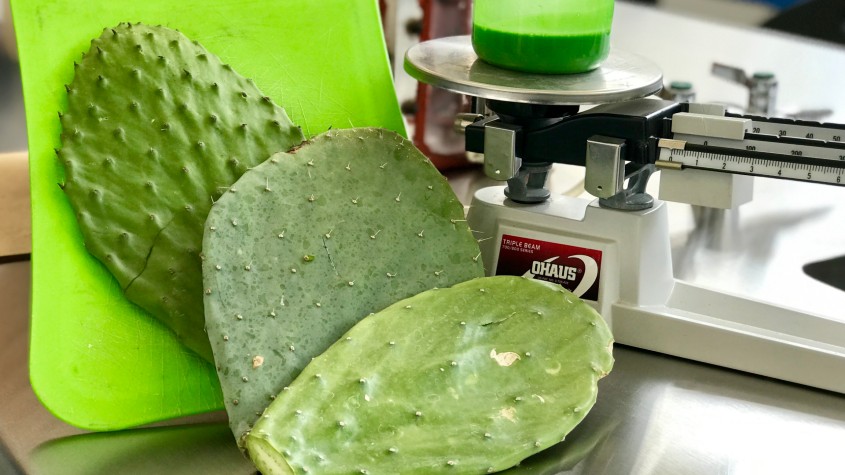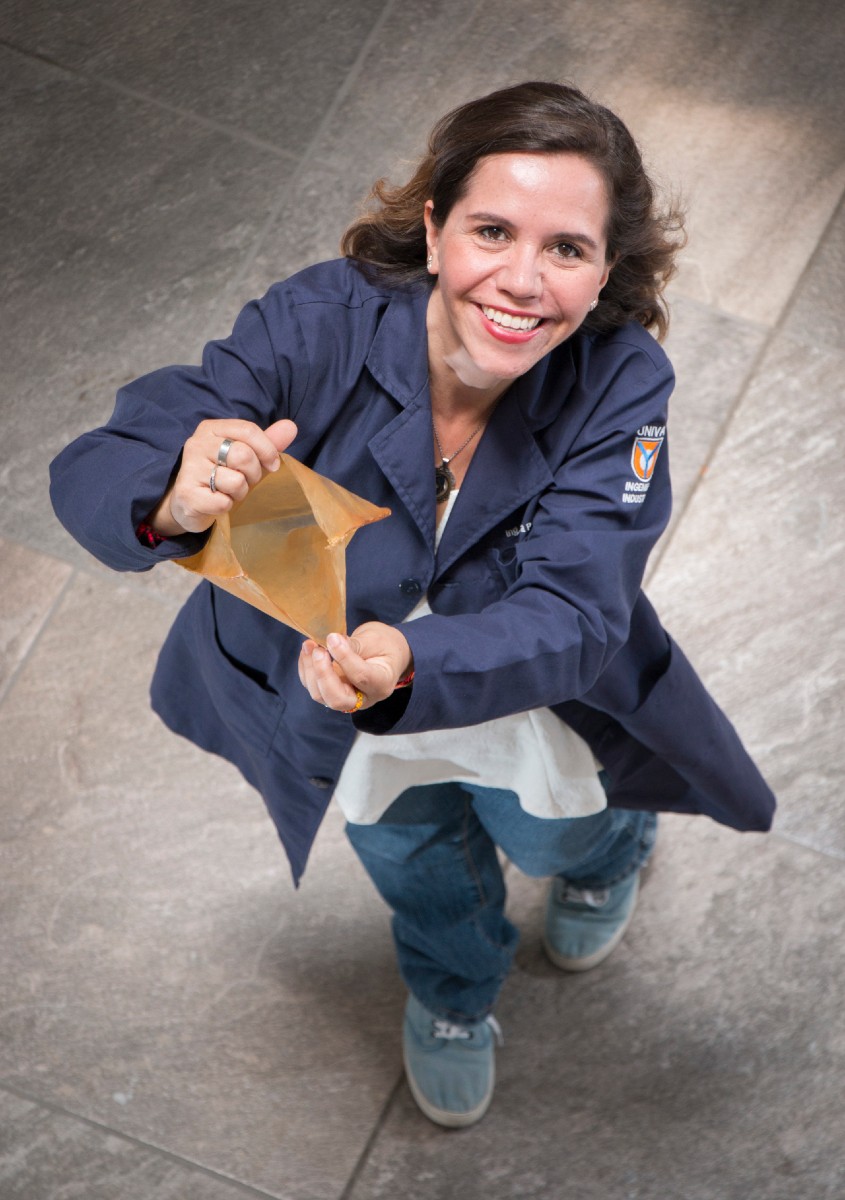Women in Green: Fantastic Plastic
July 29, 2020
By Lidia Kleshchenko, Associate Program Officer, Global Challenges Division, WIPO
What is your plastic footprint? And how can you reduce the amount of plastic waste that you generate on a daily basis? As marine and land life suffer from the consequences of plastic pollution, green innovators such as Sandra Pascoe Ortiz, winner of the first National Invention Award of the Mexican Institute of Industrial Property (IMPI), develop eco-friendly alternatives to the omnipresent plastic material.

A short bio of Sandra
Sandra Pascoe Ortiz has been a research professor at the Universidad del Valle de Atemajac in Guadalajara, Jalisco for 18 years. Her research path includes studies in Chemical Engineering and master studies in Science in Biotechnological Processes. Dr. Pascoe Ortiz is currently completing her Doctorate in Sciences in Biosystematics, Ecology and Management of Natural and Agricultural Resources (University of Guadalajara) and works mainly on projects related to sustainable development.
I got involved in the field of sustainable innovation in order to contribute my efforts to reversing the environmental damage from our technological development. I believe we must take advantage of that same development to improve our quality of life and that of future generations.
Sandra Pascoe Ortiz
Plastic in the world
In 2018, the world’s production of plastic totaled approximately 359 million metric tons, a figure that is expected to double over in the next 20 years according to a report issued by the World Economic Forum. By 2010, the world was already generating 275 million tonnes of plastic waste per year. Nevertheless, in 2015, less than 20% of all plastic waste was recycled. Most plastics in the ocean today are single-use plastics such as soft drink bottles, which take up to 450 years to degrade.
Find out more about Dr. Pascoe Ortiz’s innovation Biodegradable plastic from Prickly Pear Cactus on the WIPO GREEN database, and register to contact the inventor directly.
Tell us more about your invention.
I invented an environmentally friendly alternative to traditional plastics. It is a biodegradable plastic material, developed using the juice of succulent plants, in particular the Opuntia megacantha cactus, which is widely present in Mexico. Right now the material is at its laboratory testing stage: I am still working on exploring its potential range of use. So far, I believe that this biodegradable alternative can be used for packaging, bags, coatings, toys, and other plastic products. For example, we have already tested the material for the production of plastic films, small containers for solid products, and disposable cutlery.

As we move forward with product development, we also factor in sustainability and further social benefits of using this material. For example, I believe that this plastic alternative can be beneficial not only for the environment, but also for employment creation in the region: should the material become popular, succulent plantations could become a new avenue for the regional agricultural sector.
Moreover, I have also patented the invention in Mexico, hoping that publicly accessible information about my discovery will generate more research and development in the field of green and sustainable alternatives to plastic.
What drew you to the field of sustainable innovation?
Ever since I was young, I was interested in nature. When I became a scientist, I got involved in the field of sustainable innovation in order to contribute my efforts to reversing the environmental damage from our technological development. I believe we must take advantage of that same development to improve our quality of life and that of future generations.
What challenges did you face while working on your product?
At the beginning of my research I mainly faced challenges related to the lack of interest and support from the international community: the lack of materials, equipment, and fellow scientists willing to work with me on the project. However, in recent years, and especially after having won the prize for the best innovation from the Mexican Intellectual Property Office, it is no longer the main challenge. The interest in and recognition of my work nationally and abroad has proven the project to be worthwhile and has truly motivated me to progress forward. Today, with this biodegradable material already undergoing laboratory tests, we mostly need technical and financial support to carry out the upscaling of the project to the pilot and industrial plant levels. I am now working on exploring new ways of using the material, developing new products with it, and moving forward with the necessary tests in order to start generating the expected environmental benefits from public use of this new plastic alternative.
What do you wish someone had told you when you were starting up your research?

I would have liked to be told that nothing is easy, but that your efforts are always worth it. Working hard on your dreams is the only way to make them come true. I would also like to hear that, while any hard work bears its fruits, at the end of the day, the definition of success is to love what you do on a daily basis.
What opportunities for environmentally-friendly research and innovation do you see in the future?
I believe that, on the global level, it is the right time to turn our efforts towards using science and technology in favor of the environment, and eco-friendly business models will be the ones that have higher potential to survive through any upcoming global crises.
From the scientific perspective, we are already seeing rising trends in research and innovation towards that goal, and I am sure that further growth is yet to come. For this reason, it is not surprising that my environment-oriented invention has collected the prize of this year’s Mexico IP Office competition. I know that there are a lot more awards for eco innovators and believe that any additional support to this type of innovation is extremely valuable.
I also witness more and more women involved in the field of green innovation, and I believe that the future can offer many brilliant discoveries made by female researchers. It has been a difficult road for us as women to work our way forward in the field of scientific research, and now that we did that, I can predict many more opportunities opening up for female researchers, especially in green innovation.
Finally, on a personal level, each of us must make significant changes in our everyday habits to align our way of living with the environmental concerns we are facing. Here are five easy-to-follow advices.
Five Tips to Reduce Your Plastic Footprint
Here are the best practices for daily plastic waste reduction from Dr. Pascoe Ortiz:
- Always carry a reusable water bottle with you, especially during the warmer months
- Say “no” to plastic cutlery or straws
- Choose loose leaf tea instead of teabags to avoid microplastics ending up in waterways
- Bring your own reusable containers when buying takeaway meals
- Use reusable shopping bags - or even create a unique one from an old t-shirt that you cannot part with!
Bonus tip from Dr. Pascoe Ortiz:
Whenever making a decision, keep in mind the principle that I consider the mantra of the green economy: Reduce, Reuse, Recycle.
What three tips would you give to aspiring developers of eco-friendly products?
Do not be discouraged if you do not get the desired results at first. Be persistent, because any effort made in favor of the environment will bear fruit sooner or later. And, most importantly, never believe that there is no room for innovation, or that everything has already been invented! I have been working in the field of sustainable innovation for decades, and I know for a fact that there are hundreds of natural resources that have not yet been researched, or whereby their full potential has not yet been discovered.
What inspires you to move forward?
I am inspired by the idea of making the world a better place for those who come after me, of contributing my small grain of sand to make our world more beautiful than it is now. I believe that if each of us does what is within our reach, we can achieve it together. My contribution to this goal is the biodegradable plastic material that I discovered, which, I hope, will allow consumers to switch towards a greener way of life with minimal effort.
About WIPO GREEN
WIPO GREEN is a global marketplace for sustainable technology, supporting global efforts to address climate change. Through its online database and regional activities, WIPO GREEN connects green tech seekers and providers in order to catalyze green innovation and accelerate green tech transfer and diffusion. Subcribe to the monthly WIPO GREEN newsletter.


